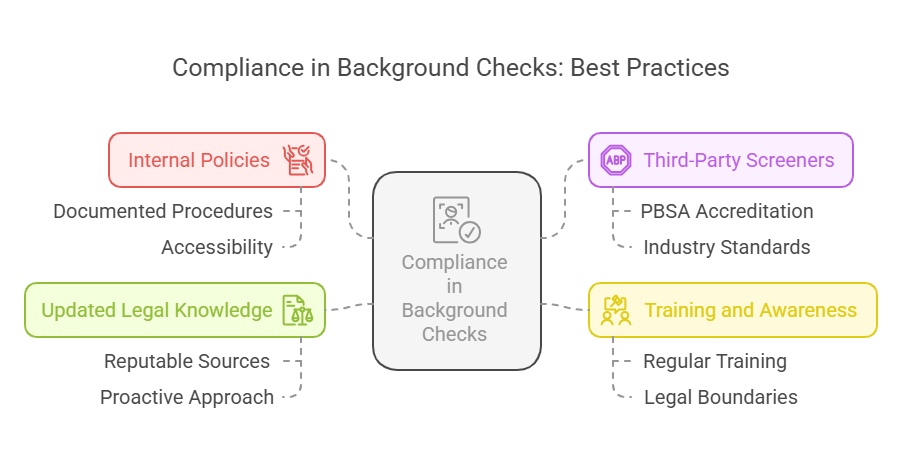Employers in Illinois face a unique landscape of rules and regulations regarding background checks on potential employees. Understanding these laws is crucial to ensure compliance and protect the organization and the prospective employee. Whether you're a business owner, HR professional, recruiter, or job seeker, this guide will walk you through the key aspects of Illinois background check laws and their implications.
Key Takeaways
- Understanding and complying with Illinois background check laws is essential to avoid legal repercussions and protect your company’s reputation.
- Illinois-specific regulations, such as the Illinois Human Rights Act and "Ban-the-Box" law, dictate how and when employers can inquire into an applicant's criminal history.
- Employers must follow state and federal laws, including FCRA guidelines, which require written consent and proper notice procedures for adverse actions.
- Industries such as healthcare, transportation, and technology have unique background check requirements that must be adhered to for compliance and safety.
- Best practices include establishing clear internal policies, using PBSA-accredited screening companies, and staying updated on legal changes to maintain fair and lawful hiring processes.
Introduction
Adhering to Illinois background check laws isn't just about ticking boxes—it's about safeguarding your business from potential legal repercussions. Non-compliance can result in hefty fines, lawsuits, and damage to your company's reputation. With employment law constantly evolving, staying informed is non-negotiable.
This article will break down the essentials of Illinois background check laws, shedding light on state-specific regulations, compliance demands, and best practices for diverse industries. Whether new to hiring or a seasoned pro, this guide ensures you're covered.
EXPERT INSIGHT: Navigating local regulations is never easy, especially when dealing with background checks. As an HR practitioner, I’ve seen firsthand how crucial this process is—not just as a formality process like ticking a checkbox, but as a vital step in building trust and integrity in hiring. Illinois is no exception to the complexity of background checks. There are differences and similarities, but the core principles remain universal -- Trust, Honesty, Respect.- Charm Paz, CHRP
Overview of Illinois Background Check Laws
Navigating the labyrinth of Illinois background check laws can be challenging, but understanding the basics is critical for compliant hiring practices. Illinois has specific statutes that regulate how background checks are conducted and used. Here's what you need to know.
State-Specific Legislation
Illinois has several key laws that govern employer background checks. The most prominent is the Illinois Human Rights Act (IHRA), which prohibits employment discrimination based on race, color, religion, sex, national origin, ancestry, age, marital status, physical or mental disability, military status, or unfavorable discharge from military service. This act intersects with background checks when considering criminal history or credit reports.
Another pivotal regulation is the "Ban-the-Box" law, which restricts when employers can inquire about an applicant’s criminal history. Employers cannot ask about criminal records on job applications. They can only delve into this information after the applicant qualifies for the position and a conditional offer is extended.
Comparison to Federal Laws
While Illinois has its own rules, federal laws like the Fair Credit Reporting Act (FCRA) also govern background checks. The FCRA requires employers to obtain written consent from applicants before conducting a background check and mandates that employers provide applicants with a copy of the report if any adverse action is taken based on the results. Compliance with state and federal laws is not optional; employers must navigate the nuances to ensure they adhere to all applicable regulations.
By understanding these fundamental laws, employers can better navigate the complexities of background checks in Illinois, ensuring they stay compliant while fostering fair hiring practices.
Key Aspects of Illinois Background Check Laws
Illinois Employment Screening
One of the first things employers need to know about conducting background checks in Illinois is the importance of consent and disclosure. Before screening, written consent must be obtained from the job applicant. This isn't just a formality; it's a legal mandate designed to respect the privacy and rights of individuals. Employers should present clear, straightforward forms that outline the background check. Transparency here sets a solid foundation for trust and compliance.
Illinois has a specific protocol regarding the timing of these checks: background checks should generally be conducted after a conditional job offer is made. This approach helps ensure that employers focus initially on the candidate's qualifications and fit for the role rather than their past. If a candidate's background check reveals information that warrants reconsidering the job offer, the employer must follow proper notice requirements.
If adverse action is taken based on the findings of the background check—meaning if the job offer is rescinded or altered—Illinois law requires that the candidate be notified. This notification must include a copy of the background check report and a summary of rights under the Fair Credit Reporting Act (FCRA). This step ensures that the candidate is fully informed and has an opportunity to dispute any inaccuracies in the report.
Navigating these requirements might seem straightforward, but failing to adhere to them can have significant legal consequences. Therefore, it's critical for employers to maintain meticulous records and ensure all processes are in line with state regulations.
Illinois HR Compliance
Ban-the-Box Legislation
Illinois' "Ban-the-Box" law is pivotal to the state's commitment to fair hiring practices. The law, officially known as the Job Opportunities for Qualified Applicants Act, prohibits employers from asking about a candidate's criminal history on the initial job application. This regulation ensures that all candidates have a fair shot at making a first impression based solely on their qualifications rather than their past mistakes.
Employers are allowed to inquire about criminal history only after the applicant has been deemed qualified for the position, and a conditional job offer has been made. This approach helps focus on the candidate's skills and experience while mitigating the immediate impact of a criminal record on employment prospects.
Handling Criminal Records
When it comes to handling criminal records, Illinois employers must tread carefully. The Illinois Human Rights Act (IHRA) and guidelines from the Equal Employment Opportunity Commission (EEOC) provide a framework for the fair consideration of an applicant's criminal history. Employers must consider the nature and severity of the offense, the time elapsed since it occurred, and its relevance to the job in question. This is often referred to as an individualized assessment.
Employers should document their decision-making process and ensure they’re considering applicants’ criminal records in a non-discriminatory manner. It is also crucial for employers to provide applicants with an opportunity to explain their criminal history and offer any evidence of rehabilitation or mitigating circumstances.
By adhering to these guidelines, employers stay compliant and foster a more inclusive hiring process. This kind of due diligence aligns with legal requirements and promotes fairness and equality in the workplace.
Illinois Legal Requirements
Sealed and Expunged Records
In Illinois, employers need to be particularly cautious about handling sealed and expunged records. The state prohibits the use of these records when making employment decisions. If an applicant has successfully sealed or expunged their criminal records, those records should not influence the hiring process. Employers must familiarize themselves with the nuances of these legal terms. Sealed records are made inaccessible to the general public but may be available through certain court orders; expunged records, however, are entirely erased as if the offense never occurred.
Employers should implement rigorous protocols to guarantee they aren't inadvertently evaluating or referencing sealed or expunged records. Opting for reputable background check agencies well-versed in Illinois law can reduce the risk of legal missteps. Failure to adhere to these regulations can unjustly harm the candidate’s chances and expose the employer to potential legal action and penalties.
Credit History
The Illinois Employee Credit Privacy Act substantially restricts the use of credit history for employment purposes. Generally, it's illegal for employers to inquire into or make decisions based on an individual’s credit history. However, exceptions apply to certain positions, particularly those involving access to sensitive financial information, trade secrets, or assets.
For roles outside these specific exemptions, employers should avoid factoring in credit histories to sidestep legal complications. If credit history checks are deemed essential for a position, it’s imperative to document the justification for this requirement, ensuring it fits within one of the law’s narrowly defined exceptions. Adherence to this act protects the rights of potential employees and shields the employer from unnecessary legal exposure.
Illinois FCRA Compliance
Illinois employers must pay particular attention to the Fair Credit Reporting Act (FCRA) compliance requirements when conducting background checks. The FCRA mandates that consumer reports (including background checks) are accurate and that applicants' privacy is protected.
Accuracy and Privacy
Ensuring the accuracy of background reports is not only a legal obligation but also crucial to maintaining the integrity of the hiring process. Inaccurate information can lead to wrongful employment decisions and potential legal ramifications for the employer. Therefore, Illinois employers should take proactive measures to verify the information obtained from background checks. This can include cross-referencing data from multiple sources and regularly updating the procedures for information verification.
Applicant privacy is another critical concern under the FCRA. This means handling sensitive information with a high degree of care. Employers should implement strict access controls to limit who can view the background check results. Additionally, all data should be stored securely and only for as long as necessary, in compliance with state and federal laws.
Adverse Action Process
When a background check reveals information that may lead an employer to take adverse action—such as not hiring a candidate—the FCRA requires a specific two-step process.
- Pre-Adverse Action Notification: Employers must provide the candidate with a pre-adverse action notice before taking any adverse action. This notice should include a copy of the background check report and a summary of the candidate's rights under the FCRA. This allows the candidate to review the report and dispute any inaccuracies.
- Adverse Action Notice: If the employer decides to proceed with the adverse action after the candidate can dispute the report, a final adverse action notice must be sent. This notice should include:
- The name, address, and phone number of the consumer reporting agency that provided the report.
- A statement that the consumer reporting agency did not make the adverse decision and cannot give specific reasons.
- Notification of the candidate's right to obtain a free copy of the report within 60 days.
- Information on how to dispute the accuracy or completeness of the report.
By carefully adhering to these steps, Illinois employers can ensure compliance with the FCRA, minimizing the risk of legal issues and maintaining a fair and transparent hiring process. For more guidance on ensuring compliance in employment background checks, read here.
How Far Back Does a Background Check Go in Illinois?
Illinois background checks generally cover the past seven years. Specific positions, especially those with greater responsibilities, may require a more extended look-back period.
How Long Does a Background Check Take in Illinois?
A standard background check in Illinois usually takes three to five business days. Additional factors or complex checks can extend this period.
Special Considerations by Industry
Staffing Agencies
For staffing agencies, the challenge is managing high volumes of candidates swiftly without compromising on thoroughness. They need robust systems to handle rapid turnaround demands while ensuring every background check adheres to Illinois regulations. Automated solutions and established protocols can help streamline the process and maintain compliance.
Healthcare
In the healthcare industry, meticulous background checks are non-negotiable. Beyond standard criminal checks, employers must verify licenses and certifications to ensure candidates meet the professional qualifications required by state regulations. This sector's high stakes mean that even minor compliance breaches can have significant consequences.
Transportation
The transportation sector, particularly involving Commercial Driver's License (CDL) holders, operates under state and federal scrutiny. Employers must consider the Department of Transportation (DOT) regulations alongside Illinois laws. Compliance in this industry often includes additional checks on driving records and substance abuse testing.
Tenant Screening
Tenant screenings for housing require a layered approach to compliance, balancing state rental laws with federal guidelines. Landlords must navigate the nuances of permissible reporting, ensuring they don't erroneously use sealed or expunged records and maintain fairness in evaluating a tenant's background.
Non-Profit
Non-profits face unique obstacles in screening volunteers, often dealing with limited funds but high responsibility. They need to ensure thorough background checks to protect vulnerable populations they might serve. Compliance is critical, and organizations must balance cost and due diligence.
Retail
The retail industry has high employee turnover, necessitating quick but reliable background checks. While speed is crucial, neglecting comprehensiveness can lead to hiring risks. Retailers must maintain efficient processes that comply with Illinois' employment screening laws to minimize legal exposure.
Technology
In tech, the issue isn't just about general compliance and precise handling of sensitive data. Employers must ensure the accuracy of background checks, as any mistake could lead to cybersecurity vulnerabilities. Equally critical is ensuring adherence to privacy laws when dealing with candidate information.
Hospitality
Customer safety is paramount for hospitality employers. Exhaustive background checks are necessary to prevent unauthorized access to guest information and ensure security. Employers must also place a high emphasis on compliance with Illinois laws to protect their reputation and clientele.
By understanding these industry-specific considerations in Illinois, employers can effectively tailor their background check processes to meet legal requirements and operational needs.
Best Practices for Compliance
Compliance isn't just about avoiding fines; it's about creating a fair, efficient, and transparent hiring process. Here's a straightforward approach to help you navigate Illinois' background check laws without breaking a sweat.
Internal Policies
First and foremost, establish clear, documented procedures for conducting background checks. This isn't something you want to leave to chance. Ensure that these policies are accessible to all relevant personnel and reviewed regularly. Include step-by-step guidelines on obtaining consent, the timing of checks, and handling results to remove any ambiguity.
Third-Party Screeners
Using reputable screening companies is non-negotiable. Opt for firms that are PBSA-accredited. Accreditation by the Professional Background Screening Association (PBSA) ensures that the screening company adheres to industry best practices and maintains high standards. This gives you an extra layer of reliability and compliance. If you need more info on PBSA accreditation, check out this link.
Training and Awareness
Train your staff thoroughly and frequently. Regular training sessions should cover the legal requirements and best practices for handling background checks. Keep everyone, from HR to hiring managers, on the same page. Don't just cover the 'how'; explain the 'why' so your team understands the importance of staying within legal boundaries.
Updated Legal Knowledge
Background check laws aren't static; they evolve. Stay updated on changes in legislation via reputable sources like SHRM and industry-specific updates. Watch bulletins, attend workshops, and consider joining relevant professional organizations that can provide timely legal updates. This proactive approach will help you quickly adapt your policies and procedures, reducing your non-compliance risk.
Following these best practices will streamline your hiring process, minimize legal risks, and create a fair environment for all candidates.

Conclusion
Navigating the intricate landscape of Illinois background check laws may seem daunting, but understanding key regulations is crucial for compliance and fostering a trustworthy hiring environment. Employers need to be acutely aware of state-specific legislations like the "Ban-the-Box" law, the proper handling of criminal records, and strict guidelines around using credit history in employment decisions. Equally important is adhering to procedures for obtaining consent, providing disclosures, and following the adverse action process. Regularly updating internal policies and using accredited screening companies can minimize legal risks.
Take the initiative to review and update your background check procedures consistently. This safeguards your organization from potential legal consequences and builds a fair and transparent hiring process, contributing to your company's reputation and overall work culture.
In the end, meticulous and compliant background checks benefit everyone involved. They help employers make informed decisions while ensuring that job seekers are treated fairly, promoting a safer and more reliable work environment for all.
Additional Resources
- Managing Screening Vendors Effectively
- Screening Practices for the Legal Sector
- Screening for Startups: A Guide
- Pre-Hire Background Checks: Everything Employers Need to Know
- Balancing Screening and Fair Hiring
- Developing Comprehensive Screening Policies
- Screening in the Transportation Industry
- Screening Gig Workers: Challenges and Solutions
- Conducting Screening in the Financial Sector
- Staying Updated with Screening Changes
- Navigating Employee Screening in the Digital Age
- Key Metrics for Evaluating Employee Screening
- Screening for Remote Workers: Best Practices
- Minnesota Background Check Laws: A Comprehensive Guide
- Top Tools for Employment Screening
- Ensuring High Accuracy in Employee Verification
- The Future of Digital Employee Screening
- South Dakota Background Check Laws: A Guide for Employers
- Tennessee Background Check Laws: Compliance Tips for Businesses
- Illinois Background Check Laws: Key Points for Employers
- Chicago Wage History Ban: How It Affects Background Checks
- Remote Work Background Checks: Illinois Employer Obligations
- Illinois Ban-the-Box Law: Compliance Guide for Employers

GCheck Editorial Team
Meet the GCheck Editorial Team, your trusted source for insightful and up-to-date information in the world of employment background checks. Committed to delivering the latest trends, best practices, and industry insights, our team is dedicated to keeping you informed.
With a passion for ensuring accuracy, compliance, and efficiency in background screening, we are your go-to experts in the field. Stay tuned for our comprehensive articles, guides, and analysis, designed to empower businesses and individuals with the knowledge they need to make informed decisions.
At GCheck, we're here to guide you through the complexities of background checks, every step of the way.





